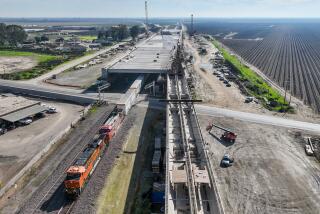Rail Panel to Return Part of Franchise Fee : Transportation: The commission overseeing plans for an Anaheim-Las Vegas high-speed train voted to give back $245,500 to Bechtel, which is no longer involved.
- Share via
ANAHEIM — The bistate commission overseeing plans for an Anaheim-Las Vegas high-speed train voted Friday to return $245,500 to the Bechtel Corp., which has dropped out of the controversial project.
In what was their last meeting--unless new legislation saves the panel--members of the California-Nevada Super Speed Ground Transportation Commission also listened as experts told them to seek at least some public financing for the project instead of counting entirely on private money.
The 16-member commission is not expected to act on the public-funding issue until after Gov. Pete Wilson decides whether to sign a bill that would reauthorize the commission to make decisions.
Wilson two months ago vetoed a bill to extend the commission’s authority past its Dec. 31 dissolution date. He cited the inability to secure financing for the $5-billion project and his preference for other rail projects that might address the unmet travel needs of a greater percentage of Californians.
Project advocates, however, have said Wilson was misinformed about the nature of the Anaheim-Las Vegas project and that he is now willing to reconsider the matter as long as public funds are not involved.
Bechtel Corp., the San Francisco-based engineering and construction firm, withdrew from the project recently after having paid a $500,000 fee to obtain a conditional franchise to build and operate a high-speed line using electromagnetic levitation and propulsion technology developed in Germany. The company cited world economic problems for its decision.
The commission spent about half of Bechtel’s franchise payment on consultants who analyzed Bechtel’s franchise proposal.
Joseph Vranich, executive vice president of the High Speed Rail Assn. based in Washington, D.C., Friday urged the commission to seek legislation that would remove the current ban on use of public funds for the project.
Recent transportation funding legislation approved by Congress contains millions of dollars that can be tapped for high-speed rail projects, he said, but the California-Nevada commission may not be able to get any of that money.
For example, Vranich said, federal loan guarantees are now available for some high-speed projects, but federal law prohibits use of those guarantees for any any project that relies relies solely on the federal government for public financing. Government agencies in California must be willing to invest some money, he said.
The federal government’s attitude toward states and local jurisdictions, Vranich said, is: “You’re either a partner or you’re not.”
Benjamin Darche, a financial analyst, told the commissioners that Bechtel failed to secure private funds for the California-Nevada project partly because investors did not have confidence in the ridership estimates, there was a lack of at least some public financial commitment and tax-exempt bonds, and also because of the potential for cost overruns and construction delays.
Some project cost estimates are now approaching $7.8 billion, Darche said, and it would take 50 to 100 banks to arrange financing for it.
More to Read
Sign up for Essential California
The most important California stories and recommendations in your inbox every morning.
You may occasionally receive promotional content from the Los Angeles Times.













